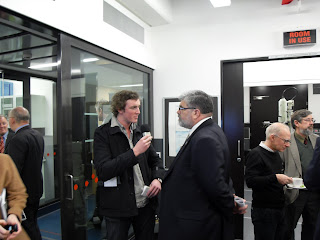‘We need to train up journalism students in blogging and we need to see that as the future of our industry,” American journalist John Nichols told the Walkley foundation in Sydney.
(Speech shown on ABCNews 24 and here on the Monthly website)
One of the first readings we had to do first semester, first year was by Nichols, the Washington correspondent for The Nation, New York.
It was a perfect introduction to the realities of modern journalism told by someone who’s been there, seen it and written about it.
‘There is a battle today between journalism and big media, being fought in every country on the planet. We are fighting to determine whether the media will be defined by the quality of its journalism or by profit for profit’s sake,’ he wrote.
‘Big media, given a free rein, will always sacrifice truth for content, always choose the bottom line over the higher ground. Profit will always trump principle.’ - Team Tactics, John Nichols, Walkley Magazine, June 2005
It was a really good article, at the same time alarming and inspiring.
In his speech to the walkleys this year, he provided a similar mix of hope and despair as he looked at the worrying question: is journalism dead?
He spoke about 'truth speaking to power' being the traditional type of journalism, and how that’s been transformed today to 'power speaking to truth'.
He listed some sobering statistics to illustrate the state of PR-driven 21st century news.
· In 1984 there was one journalist to every one public relations employee
· Today it’s one journalist to four PR people
· In the US 140 newspapers closed last year, including major daily papers
· Newspaper employees have been cut at a rate of 1,500 a month for the last two years
So in many ways, as everyone in journalism is sick of hearing, the outlook’s not good.
But…
Nichols did stress the powerful message that there’ll always be a need for the ‘truth speaking to power’ – for journalists to empower the public with information.
His voice went up a notch during that part of the speech and you could see his passion as he recited the American saying that journalists’ role is to 'comfort the afflicted and afflict the comfortable'.
This core role of journalism, he argued, must be sustained and adapted into the future.
To see Nichols talk with such feeling about journalism’s role in underpinning democracy was a great reminder that journalism is too important to watch decline.
In practise…
Nichols was a little less certain of how journalism will continue to operate into the future, competing against business interests and the changing technological landscape, but he was certain the internet is no burden to journalism’s evolution.
In fact, he said the internet shouldn’t be blamed for the decline of newspaper business models because classified advertising had been decreasing long before the age of the net.
He was optimistic that blogs can be used to great effect and that they’re a key part of the future.
To make sure journalism that afflicts the comfortable and provides important news continues, Nichols said teaching of technical blog skills is crucial and inevitable to survive the online era.
It was refreshing to see someone passionate enough about journalism and determined to see it adapt and improve, rather than doomsaying and accepting the status quo.









